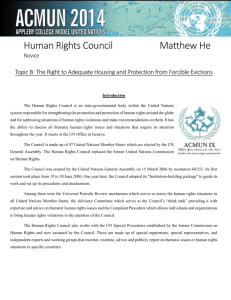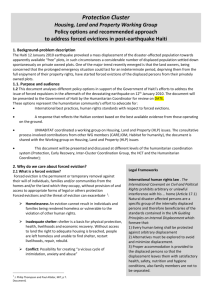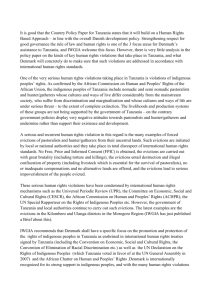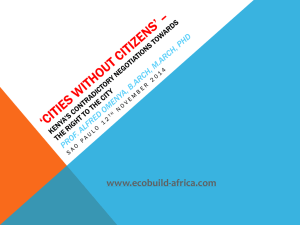here. - Displacement Solutions
advertisement
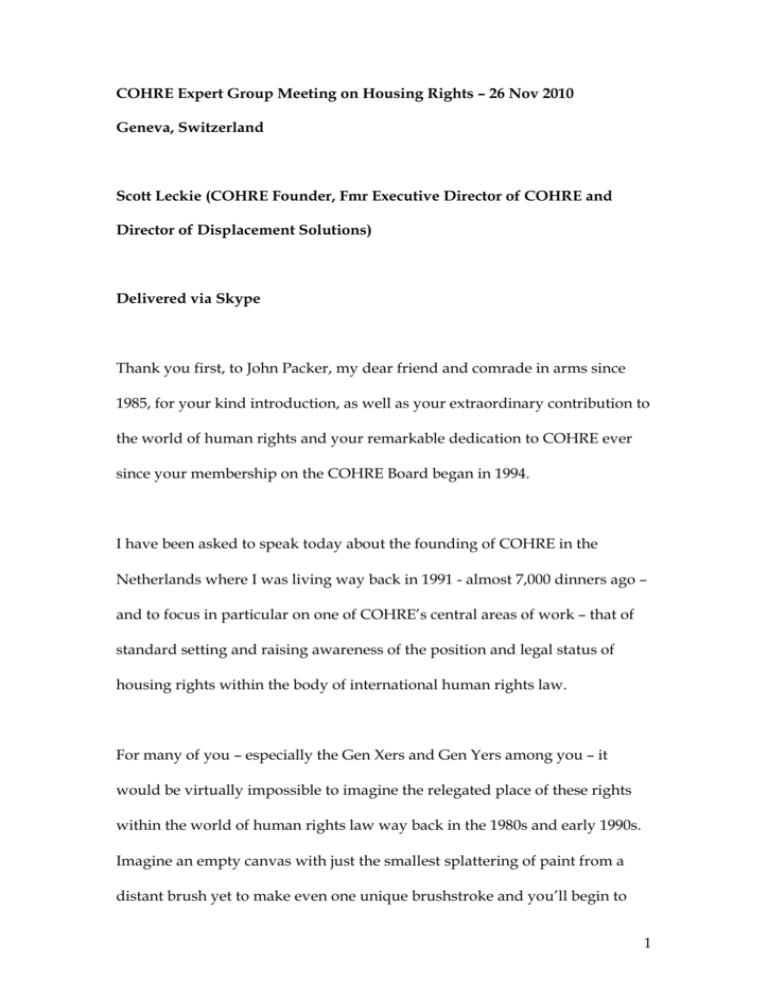
COHRE Expert Group Meeting on Housing Rights – 26 Nov 2010 Geneva, Switzerland Scott Leckie (COHRE Founder, Fmr Executive Director of COHRE and Director of Displacement Solutions) Delivered via Skype Thank you first, to John Packer, my dear friend and comrade in arms since 1985, for your kind introduction, as well as your extraordinary contribution to the world of human rights and your remarkable dedication to COHRE ever since your membership on the COHRE Board began in 1994. I have been asked to speak today about the founding of COHRE in the Netherlands where I was living way back in 1991 - almost 7,000 dinners ago – and to focus in particular on one of COHRE’s central areas of work – that of standard setting and raising awareness of the position and legal status of housing rights within the body of international human rights law. For many of you – especially the Gen Xers and Gen Yers among you – it would be virtually impossible to imagine the relegated place of these rights within the world of human rights law way back in the 1980s and early 1990s. Imagine an empty canvas with just the smallest splattering of paint from a distant brush yet to make even one unique brushstroke and you’ll begin to 1 get an image of where things were in the world of housing rights just over 20 years ago. And this, of course, was despite the fact that the term ‘housing’ was found in a whole host of standards that remain in force today. So, we faced a reality in the late 1980s where very few were writing about housing rights, no international human rights NGO anywhere paid any attention to housing rights or to the billion or more people without these rights, and certainly there was no global housing rights group in place foolhardy enough to have as its prime mandate securing housing rights for everyone, everywhere. But not for long….and before I knew it, the idea of COHRE was hatched in a small room in the Dutch city of Utrecht where I was living at the time. When what I thought was just an off-hand comment faxed to good ole Gregor Meerpohl of the German funding agency Misereor solicited his immediate reply and a gargantuan first grant of 10,000 Deutschemarks, COHRE was up and running. I was 28 years old. COHRE was formed without a business plan – or any plan for that matter – or with anything close to a vision of what it has become today; a multi-million dollar global institution with scores of staff working in offices in every region of the world. Rather, approaching the issue of housing rights and State obligations from the vantage points of justice, our shared humanity, Buddhist 2 notions of compassion and of international law, the task from the outset was to ensure that housing rights would be defined and refined in the most positive manner possible and that simultaneously, the practice of forced evictions would be labelled as a distinct violation of human rights law. Casting our minds back to the early 1990s, again, we need to recall that both housing rights and forced evictions were not even peripheral issues in the human rights world; at best they were distant concepts that even human rights NGOs (let alone States and the UN) often found laughable. I vividly recall in 1990 or so presenting a 30 page article I had spent a long time writing entitled ‘Housing Rights Violations’ to human rights bigman of the time, Neill McDermott who was then ED of the International Commission of Jurists for publication. He looked at the title, smirked as only an erudite Englishman can, and simply said “We can’t publish that; everyone knows housing rights can’t be violated”. Thank goodness times have changed. As it turned out, COHRE’s long standard-setting journey began right away in 1991 when a month of frenzied lobbying, drafting and re-drafting again finally culminated in the first ever resolution by the UN specifically on forced evictions, Resolution 1991/12. The sentiments of that first resolution, which equated evictions with human rights violations, made a real difference, and it was cited in numerous anti-eviction struggles that were being waged at the time, from Panama, to South Africa, to the Philippines. 3 Winning the battle to get evictions equated with violations spurred COHRE to train our gaze to the much broader issue of defining housing rights and government duties in the very best possible way; for defining housing rights properly would make it just that much more difficult for States to continue to effectively ignore their pre-existing obligations to respect, protect and fulfil these rights. It was clear that the UN Committee on ESC Rights, which was established just a few years before COHRE in 1986, would be an ideal place to usher in a new era for housing rights. So, in 1991, during only its fifth session COHRE was able work very closely with Committee members Philip Alston (now with NYU Law School and UN Special Rapporteur on Extrajudicial, Summary or Arbitrary Executions) and Bruno Simma (now a Judge on the International Court of Justice) to bring what became General Comment No. 4 on the Right to Adequate Housing to fruition. GC4 might not be perfect and if adopted today might include certain issues which were not so prevalent back in 1991, (especially the issue that preoccupies me most these days – climate change and HLP rights), but I think most commentators agree that this new standard was instrumental in bringing housing rights from obscurity into the mainstream of human rights discourse and action. At the level of the Commission on Human Rights a couple of years later, again after excruciating lobbying and countless hours of far too many cigarettes and coffees in the dreaded Serpentine Lounge we were fortunate to have the Netherlands (with the surprise backing of Syria!) sponsor a 4 resolution which eventually become Resolution 1993/77 on Forced Evictions. This resolution began a process of engagement on housing rights issues by the Commission and now Council which continues to this day. It’s nice to recall that COHRE’s first Chairperson of the Board of Directors, Cees Flinterman, who chaired COHRE’s Board between 1994-2004, was actually the Chairperson of the Commission on Human Rights in 1993 and was immensely helpful in ensuring that the resolution would have smooth passage. From the general, we needed to get ever more specific. So, with forced evictions now more than once classified as a violation of human rights law and housing rights defined in legal terms more comprehensively than ever before, another crucial precedent needed setting; that of declaring a single State perpetrator of forced evictions as a State acting in violation of international law. And so now, the sites were set on the Dominican Republic which rather synchronistically was to appear at the Committee’s fifth session – the same session that resulted in GC4. The Balaguer regime in the DR had been violently evicting slum dwellers from Santo Domingo since 1986 in a foolish plan to cleanse the city in the run-up to the 500th anniversary of Colombus’ accidental landing there. Putting together a detailed dossier of evidence showing that the evictions were indeed violations of human rights, and working closely with local Dominican groups like COPADEBA and Ciudad Alternativa, the Committee grilled the rather dismissive government 5 delegation, and for the first time ever, declared that a government had violated the terms of Article 11(1) of the Covenant and that any future planned evictions should be scraped. We knew it would never be enough to ensure that past evictions were simply condemned after the fact, and that it would far more important to prevent evictions before they could be carried out – and again, the Dominican Republic was the crucible for trying out this approach. Despite pleas by the UN to halt its eviction programme, Balaguer issued a Presidential Decree ordering the immediate eviction of two communities named La Cienega-Los Guandules which were home to around 70,000 people. COHRE first carried out a quick fact-finding mission to the DR to get as much evidence as we could, and then brought housing rights activists Chichi Ceballos and Ana Gomez from the DR to Geneva to testify directly about the past and looming evictions. The Committee responded to the testimony and evidence with what was effectively its first injunction – declaring to the Government of the DR that it must repeal the eviction decree and bring a permanent halt to evictions throughout the country. Amazingly enough, the Government listened, the decree was repealed and the evictions were halted. Walking through La Cienega-los Guandules as I was lucky to subsequently do many times during my time at COHRE was always one of the most rewarding of experiences. 6 Having been fortunate enough to have worked as Danilo Turk’s assistant, who is now Slovenia’s President, during his tenure as Special Rapporteur on Economic, Social and Cultural Rights between 1989-1992, it became clear that the time was now ripe for rights-specific rapporteurs at the Sub-Commission and which right better to start with than housing rights. This happened when Sub-Commission member Rajindar Sachar, then a High Court Judge in India, agreed to become the world’s first Special Rapporteur on Housing Rights. Sachar-ji (or the Sach Machine as I always like to call him) served from 19921995 and his tenure was of great importance in raising yet further the stature of housing rights within the UN. His 1995 report presented a draft Convention on Housing Rights, which we had hoped would somehow be adopted at the upcoming Habitat II Conference in Istanbul in 1996. However, US opposition to the entire notion of housing rights in the lead up to Istanbul - Yes, during the Clinton years! – not Reagan, not Bush, but the Clinton Administration - ed with almost religious fervour by US State Department official Mike Dennis, scuppered any chance of a new treaty becoming what could have been the crowning glory of a global gathering that did indeed preserve housing rights, but without any new laws, mechanisms or monies devoted to pushing the housing rights envelope ever further. The Netherlands government again played a pivotal role in the struggle for housing rights, and in that regard I have to acknowledge the stupendous efforts of Dutch diplomat Karin Wester who – despite being mugged one late 7 night in Istanbul during Habitat II following a lengthy and difficult late night drafting session that lasted until the wee hours, did more than any other governmental official at Habitat II to protect housing rights from the relentless assault led by the United States - And, yes, all of the drafts of what was to become the final language of the Habitat II document were stolen along with her money and credit cards so we had to make it all up again by memory…and, no, I did not pursue the mugger down the dirty dark alley into which he disappeared…The next day was spent in Turkish police stations but that’s another story for another day. And, then, a year later in 1997 it was time again to try to expand the boundaries of international law and really put meat on the bones of the notion that evictions were violations of human rights. And where else to try this than at our beloved Committee on ESC Rights, now chaired by our old friend Philip Alston? With Bruno Simma leading the charge among Committee members and COHRE providing drafts, comments and lobbying support, in May 1997 General Comment No. 7 on Forced Evictions was approved, thus again adding to the corpus of international legal tools available to people everywhere to try and halt forced evictions wherever they occur or are planned. During COHRE’s next ten years we continued to work intensively on standard setting on both the issues that dominated the 1991-1997 period, as 8 well as on a series of new issues that we thought needed to be brought from obscurity to mainstream. We were able to push successfully for the creation of new Special Rapporteurs on issues as diverse as Human Rights and Income Distribution (Asbjorn Eide), Housing and Property Restitution for Refugees and Displaced Persons (COHRE Board Member Paulo-Sergio Pinheiro), as well as a new position of Housing Rights Rapporteur at the Commission on Human Rights. COHRE was able to achieve further forced eviction resolutions, as well as new standads on housing and property restitution rights for IDPs and refugees, women and housing rights, human rights and structural adjustment and a range of other themes. Equally, COHRE was the driving force behind what became the Maastricht Guidelines on Violations of ESC Rights, General Comment No. 15 on the Right to Water, The Pinheiro Principles on Housing and Property Restitution for Refugees and Displaced Persons, as well as one of the first proponents of new texts such as the Optional Protocol to the Covenant and many others. Of course, it’s important to remember that COHRE was never only about standard-setting. COHRE was always, and remains today, really about justice and people, and continues to be dedicated to its basic aims of promoting housing rights and ending forced evictions for everyone, everywhere. As we all know all too well, for hundreds of millions of people across our one 9 world, housing rights remain a distant dream, and for many nothing less than a living nightmare. In far too many places things are getting worse. So it’s clear that COHRE’s purpose, COHRE’s place within the ever growing global human rights community, it’s raison d’être, remain as necessary as on that day in Utrecht in 1991 when COHRE’s work began in earnest. COHRE’s work in the regions – Asia, Africa and Latin America – as well as it’s work on ESC rights litigation, women and housing rights and other areas continues to make a unique contribution. Much remains to be done, of course, and there is no guarantee that the progress achieved over the past two decades will necessarily remain in place in an era of continuing economic fragility in so many countries. COHRE will need to remain diligent, creative and engaged to ensure that the victories of the past are secure and that new initiatives are undertaken to expand housing rights protections ever further. For instance, working together with the Special Rapporteur Raquel Rolnick promoting the idea that States at least quadruple government expenditure on housing matters could be a good place to start. It’s long past time for Government’s to put their budgets in order and devote the resources required to make the dream of housing rights a reality for all. COHRE and the UN together can push successfully to make this happen. 10 Though I made the best decision of my life when I decided to step down as COHRE ED and Founder in 2007 to be a stay-home, full-time Dad who no longer has to travel six or more months a year as I did during my tenure with COHRE - and to start two new organizations Displacement Solutions and Oneness World (with the much appreciated assistance of COHRE Board member Robert Zoells to whom I am immensely grateful) - I would still like to urge everyone working for COHRE today to be fully aware of the unbelievable privilege it is to actually get paid to do human rights work, and of the infinite possibilities to change the world that exist by working within this still wholly unique institution. I would also urge donors to continue their support for COHRE, an organisation whose best years clearly lie ahead. Thank you again for inviting me to your gathering in the mighty lakeside city. It has been a great pleasure speaking with you. Have a great meeting! 11

